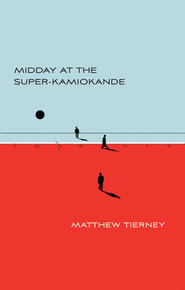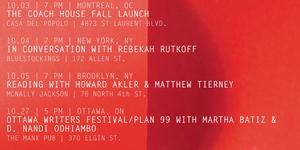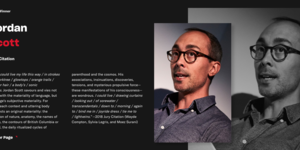
Sunday Poetry with Matthew Tierney
Part existentialist cry, part close encounters of the other kind, the poems of Midday at the Super-Kamiokande zip and whiz about the page with beguiling abandon.
Hey, sleepyheads! It's been a minute since we’ve brought a poem to your inbox on any given Sunday, but we haven't been snoozing on making books! We released three new collections of poetry this fall, including Midday at the Super-Kamiokande by Matthew Tierney, featured below. If you like what you've read, join us at Matthew's launch this coming Thursday in Toronto. He'll be in conversation with fellow CH poet Linda Besner, who will be asking him the tough questions like “This poetry book blabs a lot about the sun. Moon not good enough for you?”
The Goldilocks Zone
When the thunder shower arrives,
the heavy air around me (how revolutionary)
rises up to meet it.
You’d know the feeling
sheltered in the thick of it.
I’m intrapsychic.
Shortly I’ll be gifted
with an ability to foretell the future.
Until then all I remember
has been present perfect.
His tantrum in the bathtub
made possible by the plumbing of
the sufficiently advanced.
Rain soaks
the belongings of an evicted tenant
strewn on the lawn across the street.
A life blown up like some, um,
celestial event.
They should have sent a poet’s poet.
Out my cockpit’s cockpit,
universal decoherence. Rowhouses.
The key to exiting the wormhole is
don’t think about a key.
Matthew Tierney on “The Goldilocks Zone”
I remember watching Contact when it first came out and finding it ridiculous for a host of reasons but mostly Matthew McConaughey as spiritual advisor Palmer Joss, a self-described “man of the cloth, without the cloth,” who conveniently entered the frame at every plot turn, often in overcoat and blanket scarf.
I rewatched Contact a few years ago and all the other reasons came flooding back. It is, after all, a Robert Zemeckis film.
It’s now a trope of sci-fi movies that, at some point, someone on the brainy dream team assembled to investigate extraterrestrial activity will lament that NASA didn’t send a poet. If you don’t find this bone-bruisingly hilarious, you don’t spend much time around poets. But it’s also worth unpacking; there’s inarguably a cultural expectation that poetic expression can provide value on par with (I suppose) exobiology. Of course, only when all else fails.
Consider the eviction in this poem. One day at the top of my street a person’s entire belongings washed up on the lawn. I didn’t know the person, had no access to the specifics (the legal notice on the front door was boilerplate). Someone was having an extremely bad day after what I could only conjecture was a series of months, maybe years of bad days.
There was pain there. How was one to bridge the gap? If poetry is the truest expression of our shared humanity, surely, then, a poem?
Probably not. Ben Lerner, in The Hatred of Poetry, repeats the hard line that a poem is “always a record of failure,” a flawed incarnation of the transcendent—hence unattainable—POEM. “The Goldilocks Zone” takes this to heart. It fails—or more precisely, fails to even try to fail. (Is that more precise?) The speaker of this poem is feckless, not without sympathy for the tenant but unable to get out of his own head, his own present circumstances. He hands off the task to a “better” poet, a poet’s poet, one more link down the chain.
As Michael Robbins says, “There is no limit to what a poem can’t do.” In the final couplet, maybe the indictment of abstraction is a start. Maybe there is residual value in arriving at the metaphoric key.
Maybe they should have sent a locksmith.

Midday at the Super–Kamiokande (2018)
Midday at the Super–Kamiokande is part existentialist cry, part close encounters of the other kind. Like the neutrino observatory of its title, it seeks ‘glimpses of the obscure’ to carve out meaning, alternately a resistance to rationalism and its champion. These are poems with no middle; These are poems of beginnings, and of ends.
Matthew Tierney is the author of three previous books of poetry. His most recent is Probably Inevitable, which won the 2013 Trillium Book Award for Poetry in English. His previous book, The Hayflick Limit, was shortlisted for a Trillium Book Award. He is a recipient of the K. M. Hunter Award, and has placed his poems in numerous journals and magazines across Canada. He lives in Toronto.

